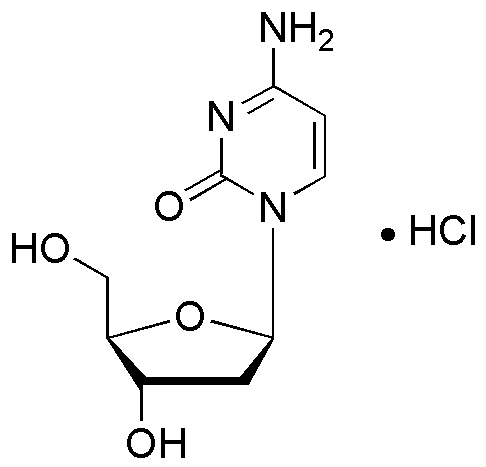2'-Deoxycytidine hydrochloride is widely utilized in research focused on:
- DNA Synthesis: This compound serves as a building block in the synthesis of DNA, making it essential for genetic research and biotechnology applications.
- Antiviral Research: It is used in studies aimed at developing antiviral therapies, particularly for viral infections like HIV, due to its role in nucleoside analogs.
- Cell Culture: Researchers incorporate it into cell culture media to support the growth of various cell lines, aiding in cancer research and drug development.
- Genetic Engineering: The compound is crucial in CRISPR and other gene-editing technologies, allowing scientists to manipulate genetic material effectively.
- Pharmaceutical Development: It is explored in the formulation of nucleoside-based drugs, providing therapeutic options for various diseases, including cancer.
Informations générales
Propriétés
Sécurité et réglementation
Applications
2'-Deoxycytidine hydrochloride is widely utilized in research focused on:
- DNA Synthesis: This compound serves as a building block in the synthesis of DNA, making it essential for genetic research and biotechnology applications.
- Antiviral Research: It is used in studies aimed at developing antiviral therapies, particularly for viral infections like HIV, due to its role in nucleoside analogs.
- Cell Culture: Researchers incorporate it into cell culture media to support the growth of various cell lines, aiding in cancer research and drug development.
- Genetic Engineering: The compound is crucial in CRISPR and other gene-editing technologies, allowing scientists to manipulate genetic material effectively.
- Pharmaceutical Development: It is explored in the formulation of nucleoside-based drugs, providing therapeutic options for various diseases, including cancer.
Documents
Fiches de données de sécurité (FDS)
La FDS fournit des informations de sécurité complètes sur la manipulation, le stockage et l’élimination du produit.
Spécifications du produit (PS)
Le PS fournit une description complète des propriétés du produit, notamment sa composition chimique, son état physique, sa pureté et les exigences de stockage. Il détaille également les plages de qualité acceptables et les applications prévues du produit.
Certificats d'analyse (COA)
Recherchez des certificats d'analyse (COA) en saisissant le numéro de lot du produit. Les numéros de lot et de lot se trouvent sur l'étiquette d'un produit, après les mots « Lot » ou « Lot de fabrication ».
Numéro de catalogue
Numéro de lot/série
Certificats d'origine (COO)
Ce certificat d'exploitation confirme le pays dans lequel le produit a été fabriqué, et détaille également les matériaux et composants utilisés et s'il est issu de sources naturelles, synthétiques ou autres sources spécifiques. Ce certificat peut être requis pour les douanes, le commerce et la conformité réglementaire.
Numéro de catalogue
Numéro de lot/série
Fiches de données de sécurité (FDS)
La FDS fournit des informations de sécurité complètes sur la manipulation, le stockage et l’élimination du produit.
DownloadSpécifications du produit (PS)
Le PS fournit une description complète des propriétés du produit, notamment sa composition chimique, son état physique, sa pureté et les exigences de stockage. Il détaille également les plages de qualité acceptables et les applications prévues du produit.
DownloadCertificats d'analyse (COA)
Recherchez des certificats d'analyse (COA) en saisissant le numéro de lot du produit. Les numéros de lot et de lot se trouvent sur l'étiquette d'un produit, après les mots « Lot » ou « Lot de fabrication ».
Numéro de catalogue
Numéro de lot/série
Certificats d'origine (COO)
Ce certificat d'exploitation confirme le pays dans lequel le produit a été fabriqué, et détaille également les matériaux et composants utilisés et s'il est issu de sources naturelles, synthétiques ou autres sources spécifiques. Ce certificat peut être requis pour les douanes, le commerce et la conformité réglementaire.


